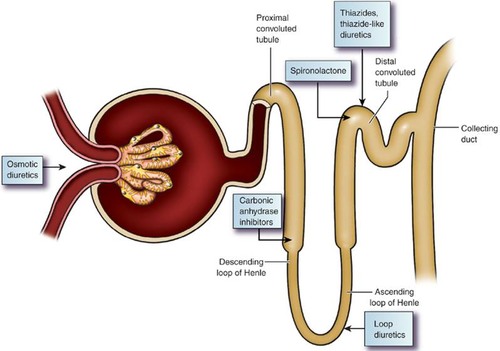This is how diuretics cause Erectile Dysfunction
Erectile Dysfunction is a problem that affects a lot of men regardless of their race, age, and other factors. While the issue may be more prevalent in some people, every single man on this planet is in the risk zone of experiencing problems with achieving erection. For younger men this problem is much more impactful compared to men of age who are usually much more comfortable with having erectile dysfunction. One of the causes of ED in younger men is using diuretics.
 There are several reasons why diuretics cause problems with erection and they are related to multiple aspects of physiology and metabolism. As several types of diuretics exists, there are various ways how they affect our bodies. Before we describe how specific types of “water pills” can negatively affect your sexual life, we need to understand some of key reasons why ED occurs in the first place.
There are several reasons why diuretics cause problems with erection and they are related to multiple aspects of physiology and metabolism. As several types of diuretics exists, there are various ways how they affect our bodies. Before we describe how specific types of “water pills” can negatively affect your sexual life, we need to understand some of key reasons why ED occurs in the first place.
Erectile Dysfunction causing physiological mechanisms
Erectile dysfunction is a complex problem with relatively simple roots. One of the simplest solutions ever presented to the world was Viagra and its class of drugs called PDE5 inhibitors. Their pharmacological function is not complicated at all. The drug affects the the cGMP production rate and simultaneously decreases the blood pressure while helping cavernous tissues in penis to soak blood qucker thus allowing for a stronger more controllable erection. Note that this solution answers a very specific problem – the inability of cavernous tissues to soak blood.
This issue can be caused by a rich variety of factors ranging from problems with the blood vessel system to adverse effects of drugs including diuretics. However, the problem itself is much more complicated. The problem is that ED is often a side effect of drugs that are essential for treatment of specific diseases. For example, Beta-blockers and alpha-blockers may cause minor issues with erection and sexual performance in general.
The complexity of the issue makes it harder to simply pinpoint the one exact root. Diuretics are well-known drugs and we know a lot about their overall mechanisms of action and potential adverse effects. Nevertheless, we still continue to analyze various effects of such drugs on our life. While diuretics on their own rarely present a threat to your sexual function, combined with other problems, they can be quite troublesome.
How diuretics work
Diuretics are a group of drugs that encourages the production of urine in the organism. The mechanism of action may differ in various drugs and their effectiveness often depends on the type of the treatment plan developed for specific patients. There are drugs that counteract the natural function of hormone Vasopressin which is responsible for normalized excretion of water. There are other types of drugs that promote the excretion of active metals. The range of drugs that can be classified as diuretic is quite wide.
The rich assortment of possible drugs means that there is a wide array of possible medical applications.
These drugs are used to treat a multitude of health issues including:
- Problems with liver and kidney (liver cirrhosis is a perfect example);
- Hypertension and specific heart problems;
- Water poisoning;
- Influenza and others.

One of the key diseases treated by this group of drugs should be in the center of our attention. Hypertension is a condition when you have high blood pressure due to tense arteries. The blood vessel system struggles to transport the blood around. This naturally leads to problems with erection which relies on normal blood flow and effective process of soaking the blood. Many diuretics help to normalize the blood pressure and thus mess with the ability of various body parts to transport blood.
While improving the production rate of urine is the main task of diuretics, there are drugs that are designed to widen the therapeutic scope for hypertension allowing for a more versatile treatment strategy when needed. These drugs may create specific problems with erection.
The overall impact of diuretics
Over the course of years various researches have been conducted to find out whether diuretics cause erectile dysfunction or not. While various manifestations here and there signal that diuretics are responsible for some cases of ED, the exact mechanism of action and actual rate of occurrence of such adverse effects remains unclear. We still cannot definitively say why diuretics cause ED and how it happens. However, there is a dense body of researches that helps us to better understand the topic at hand.
One of the most impactful researches was conducted in 1991 by a group of scientists from USA. Their findings indicated that the vast majority of men who used diuretic reported a significant decrease in the quality of their sexual lives. The subjects were selected from a wide pool of men aged from 35 to 70. There were 176 men who participated in the study and all of them reported problems with erection. Note that the research method was a randomized placebo-controlled test.
One of the key findings of the research is that other aspects of social lives of the subjects were not affected by diuretics at all. The questionnaire offered to all participants by the end of the study covered not only the quality of sexual life but also all other aspects of social life that could have been affected by diuretics.
Despite not fully understanding how diuretics cause erectile dysfunction, we do know they these drugs are the cause of ED in many cases.
Common problems with diuretics and ED
As mentioned above, we cannot blame diuretics alone and have to look at the problem through a larger prism. The main problem that many men face at certain ages is that of high blood pressure. The vast majority of men with constant issues with high blood pressure usually report significant decreases in their control of erection. Hypertension is one of the common problems that cause erectile dysfunction.
Diuretics are commonly used to treat high blood pressure and often decrease the blood pressure to the point where the organism is incapable of controlling the erection. It is hard to achieve a strong erection. This happens on the background of having problems with hypertension which is a natural “enemy” of erection. When combined together, these issues are more likely to cause erectile dysfunction to at least some degree.
One of the most obvious examples is the group of drugs called look diuretics and thiazides. Their mechanism of action is not reliant on the diuretic effect itself and often ensures significant reduction in blood pressure levels in a completely different way. The dose needed for the effect is usually lesser compared to the dose required to trigger the diuretic effect. There are examples of “water pills” that were designed specifically to act in such manner. One of them is Indapamine developed several decades ago. Note that such drugs can also cause minor problems with erectile dysfunction.
While the whole complex problem of hypertension and how it is treated by diuretics is definitely an important one, we must not forget about a multitude of other factors that may seem minor but also affect the quality of sexual life of any man.
One of the most interesting things about many diuretics is that they may reduce the amount of zinc in the body. This metal is extremely important for metabolism and often required to produce testosterone which is a hormone essential for the sexual function. While this not directly affects erection itself, the quality of sexual life and libido may be both severely decreased by the absence of zinc in the body. This is also a very important issue that we should consider.
Amongst the most commonly mentioned drugs that may cause problems on the sexual front are chlorthalidone which is often used to help with weight loss. This drug belongs to the group of thiazides and presumably decreases the responsiveness of smooth muscle cells thus making it harder for cavernous penile tissues to soak in blood. This is often treated with Viagra and similar PDE5 inhibitors. Another drug notorious for inducing a variety of sexual dysfunctions including ED is Spironolactone which has been around for several decades now and has been extensively used to treat hypertension.
Conclusion
Diuretics undeniably affect negatively sexual functions in men. However, we cannot avoid using them since diuretics are simultaneously extremely efficient in treating a rich assortment of diseases. We must learn how to use them carefully and counteract their adverse effects through specific means of therapy and recovery.






